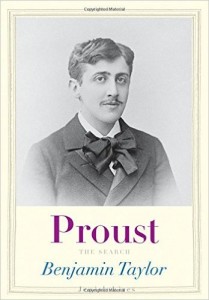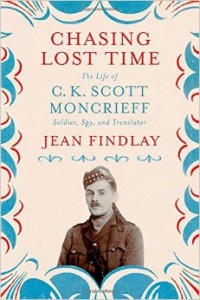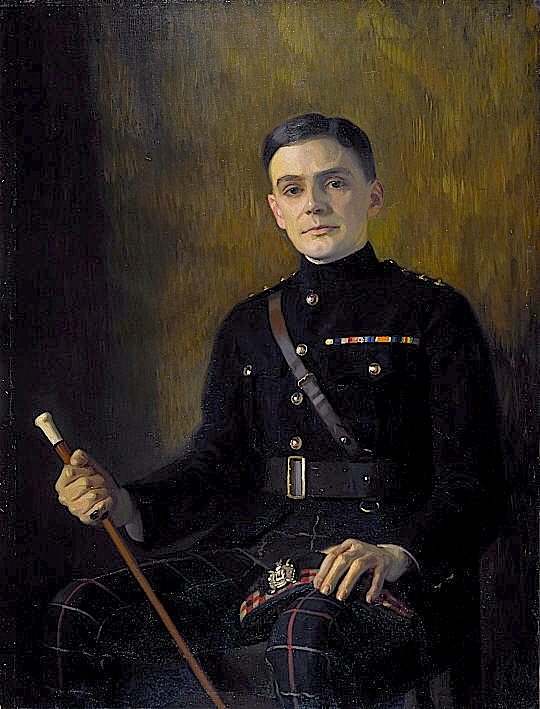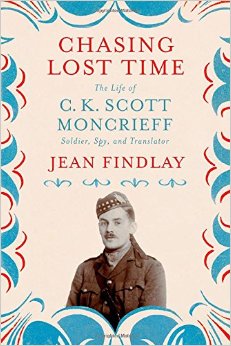 Proust: The Search
Proust: The Search
by Benjamin Taylor
Yale University Press
199 pages, $25.
 Chasing Lost Time: The Life of C. K. Scott Moncrieff, Soldier, Spy, and Translator
Chasing Lost Time: The Life of C. K. Scott Moncrieff, Soldier, Spy, and Translator
by Jean Findlay
Farrar, Straus and Giroux
351 pages, $30.
IN THE NOVEL by Marcel Proust that used to be called Remembrance of Things Past but is now called In Search of Lost Time, there’s scarcely a trace of religion—no crisis of belief, no debate over the existence of God. The narrator doesn’t lose his faith. It’s not even mentioned. In his new biography, Benjamin Taylor refers to Proust’s “first and last Communion,” but the implication is that after his First Communion, Proust never went to communion again. When a Communion wafer appears in the novel, it is only a metaphor for the sensation of a kiss. The masterpiece that is so often compared to a French cathedral is filled not with priests and penitents but with social climbers and homosexuals lurking in the nave. Paradise is not eternity with God but past happiness we can only retrieve through involuntary memory or art. Yet the reason John Updike referred to Proust’s novel as “a book of consolation” and Benjamin Taylor calls it “a Guide of [sic]the Perplexed” is surely its religious tone.
Proust was the product of a mixed marriage—Jewish mother, Catholic father—which is presumably why Taylor’s book is one of the “Jewish Lives” series published by Yale University Press. There is, however, comparatively little in Taylor about Proust as a Jew. It’s only when the Dreyfus case appears that Taylor confronts this theme. Alfred Dreyfus was a Jewish captain in the French Army—in real life and in the novel—who was falsely accused of passing secrets to the Austrians. But the fact that both Proust and his novel’s narrator were pro-Dreyfus does not make Proust a Jew in Taylor’s eyes: “Marcel campaigned on behalf of Dreyfus. Was this because he felt Jewish? Certainly not. Proust saw himself as what he was: the non-Jewish son of a Jewish mother.”
If Proust didn’t think of himself as a Jew, however, in reading Taylor we note that others did. Colette, for instance, used Proust in one of her novels as the model for a character described as “a young pretty-boy of letters,” though what she actually wrote in her manuscript was a “young kike of letters,” Taylor informs us. It was her husband and literary manager Willy who emended that to “pretty boy.” When Proust became famous, the stereotyping intensified. Encountering Proust at a gathering to award a literary prize, one committee member recalled: “Despite the moustache, he had the look of a sixty-year-old Jewish lady who might have been beautiful. His eyes, in profile, were oriental.” Then there is “an entry in the diary of British diplomat and author Harold Nicholson, who’d dined with Proust … that spring: ‘pale, unshaven and dirty, with a face like papier mâché,’ Nicholson noted; and ‘very Hebrew’—which was true,” Taylor writes. “People more and more saw in him the Old Testament prophet.” And finally, François Mauriac, after dining at Proust’s apartment on rue Hamelin, wrote: “A curious supper … at ten o’clock at night at Proust’s bedside: sheets none too clean, the stench of the furnished flat, his Jewish features, with his ten-day growth of beard, sinking back into ancestral filth. A subject resumed in his books.” Mauriac, Taylor adds, “is surely thinking of the famous passage in Sodom and Gomorrah about how Jewish the dying Swann had come to look.”
Proust’s mother came from a family of rich stockbrokers, the Weils, who seem to have been highly assimilated, worldly, and French. Madame de Sévigné was her favorite author. Her English was good enough to enable her son to translate John Ruskin—something he could not have done without her. When she married it was stipulated that she would not convert but that her offspring would be raised Catholic. Proust’s father, a doctor, does not seem to have been terribly religious either. When he caught Proust masturbating, he sent his son not to confession but to a brothel. Neither of his parents’ religions seemed to dominate Proust. As Taylor puts it: “Judaism and Christianity, the enemy creeds of Marcel’s maternal and paternal ancestors, had beautifully canceled out in him. He was what he would remain: a congregation of one.”
Perhaps that’s why Proust was able to create Jewish characters as varied as Swann, the refined fashionable æsthete, and Bloch, the boorish social climber—creations who imply in their author an ability to see French Jews with both detachment and familiarity. One can’t tell if the author is writing about a part of himself or someone with whom he does not at all identify. Once, on vacation, Proust wrote to a Catholic friend that “a few Jewish dry-goods merchants make up the hotel’s aristocracy; moreover, haughty.” On the other hand, when Robert de Montesquieu (the model for the great homosexual character the Baron de Charlus) made anti-Semitic remarks in Proust’s presence, Proust promptly wrote to him: “Dear Sir, Yesterday I did not answer the question you put to me about the Jews. For this very simple reason: though I am a Catholic, like my father and brother, my mother is Jewish. I am sure you understand that this is reason enough for me to refrain from such discussions.” But then, Taylor writes, “He added, in a telling phrase that perhaps summed up his feelings about his maternal heritage, that he was ‘not free to have the ideas I might otherwise on the subject.’ This choice of words, so tense with ambivalence, is Marcel’s deepest avowal about the Jews. He was not at liberty to dislike them.”
Yet it’s Proust’s mother (grandmother in the novel) whose presence pervades Proust’s book. Not only does his love for her suffuse the section describing the narrator’s grief when his grandmother (mother) dies, she also lies behind the great, somber essay on homosexuality that opens Cities of the Plain, linking Jews and homosexuals as a “cursed race” whose members must lie to their mothers all their lives about their sexuality. Proust, whose last word was “Mother,” once told his servant Celeste that he would die in a minute if he knew that this would reunite him with her. In a way, his entire novel is merely an attempt to recreate a period in his life when she was alive; in the book, the mother never dies, only the grandmother.
Since Jewish identity is thought to be passed down through the mother, that presumably was enough for whoever was in charge of Yale Press’s “Jewish Lives” series to have asked Taylor to write this book. Yet, after telling us that Proust did not feel Jewish, Taylor goes on to entertainingly recapitulate a life much like the one that biographers George Painter, William Carter, Jean-Yves Tadie, and Edmund White, among others, have told before. Proust’s Jewishness is illuminated almost accidentally in the telling. Take, for example, the well-known story of the night Proust flew into a rage after being rebuked by his parents for his spending habits (though Taylor speculates it may really have been about a photograph in which an effeminate Lucien Daudet is looking at Proust, his boyfriend at the time, with unmistakable love). Furious over the criticism, whatever the cause, Proust not only smashed one of his mother’s vases but probably broke the glass on a French door by slamming it, and then wrote a letter of apology to his parents, to which his mother replied: “From now on let the broken glass be what it is in the synagogue—a symbol of indissoluble union.” That little sentence, its tenderness, its wisdom, somehow captures the tone of the book Proust was to write—a book whose muse would not live to see it, since it was only his mother’s death that galvanized Proust into finally getting to work. (The real subject of Taylor’s life, it seems—what Updike said is the reason we read all literary biographies—is to see “how the author did it.”)
Still, one wonders where the novel’s tone of Olympian detachment and Old Testament moral judgment comes from—father or mother, Christianity or Judaism—given that the Hebraic and Christian traditions share so much. It would require a scholar to parse every page of the novel to separate them out (as Margaret Topping has done in her book Proust’s Gods). There were so many influences: Proust’s education in philosophy and the classics, and the influence of the devoutly Christian art critic John Ruskin. The latter was extremely important. “Art divinizes,” Taylor writes, “according to Ruskin, according to Proust. Of course the great difference between them was, as Tadie says, ‘that the Bible lay at the heart of Ruskin’s æsthetics; it was his religious fervor that had guided his æsthetic feelings; Proust would retain the divine without the religion.’” He believed, in short, in the religion of art.

WHEN JEAN COCTEAU went to Proust’s apartment the afternoon Proust died, Taylor tells us in his opening paragraph, Cocteau not only “summoned [Man] Ray to 44, rue Hamelin to take the final picture (the one that makes Proust look like a cadaverous Jewish prophet)” but, “left alone briefly with the body that afternoon, Cocteau noted the vast manuscript of In Search of Lost Time on the mantelpiece of the bedroom” and later wrote: “That pile of papers on his left was still alive, like watches ticking on the wrists of dead soldiers.” This brilliant image provides an uncanny link between Taylor’s biography and the one Jean Findlay has written of her grand-uncle Charles Scott Moncrieff, the man who translated Proust into English. Dead soldiers with ticking watches were something Scott Moncrieff had seen plenty of by the time he translated Proust; reading Findlay, it’s hard to understand how he escaped becoming one himself.
If both Proust and Scott Moncrieff believed in the divinity of art, the latter was a Scottish Presbyterian who converted to Catholicism after walking into the cathedral of Rouen in the middle of World War I. The æsthetic movement arose before the war that almost destroyed the civilization that had produced it, of course, but the conflict affected all of its acolytes, albeit in different ways. Henry James went to work for the war effort and became a British citizen. Proust remained in Paris, working on his book, too ill to be drafted. The War not only suspended publication of his novel but caused him to expand it. (It also killed so many French typesetters that the portion of his novel set to type after the conflict, Findlay tells us, would be full of misprints, making Scott Moncrieff’s task even harder.) One of the most haunting scenes in Remembrance of Things Past takes place during an air raid as the narrator walks home from a male brothel; everything—the bombs, the Zeppelins, the sky—is described as a night scene by El Greco. Proust uses the War as another backdrop against which to portray his characters. Scott Moncrieff spent much of it in the trenches as a captain who led his men with such fearlessness that one of them called him, with admiration, “offensively brave.”
Because Scott Moncrieff, like Proust, had studied Greek and Latin, he went into battle with concepts of glory furnished by The Iliad and The Aeneid. But he was one of the poets, like Wilfred Owen, Siegfried Sassoon, and Rupert Brooke, whose lives would be ended or scarred by the War. After the peace, he continued to write poems but made his living as a journalist, newspaper editor, and translator. He was a translator for hire, supporting his nieces and nephews, and seems to have attached no particular place of honor to his Proust; after Proust he went on to translate Stendhal and Pirandello. But Scott Moncrieff is not only the crucial medium by which Proust came to be known to English readers but also the author of a translation so beautiful that a British critic of the time said Proust’s novel is better in English than in French.
One is often told that the main difference between the two is that Proust is funnier in French—though it’s hard to imagine how Scott Moncrieff’s translation of the scene in which the narrator stamps Charlus’ hat to bits after the baron insults him during a very oblique attempt to seduce the young man could be funnier in French. Then there is the matter of the titles. By now most people know that Remembrance of Things Past, taken from a Shakespeare sonnet, has been replaced in the newest translation with the more literal In Search of Lost Time. There was also a problem with the title of Swann’s Way, which Proust’s English admirer, Sidney Schiff, told Proust can only mean “à la manière du Swann” in English—though Taylor points out it can mean “The Walk by Swann’s House” as well. “It seems Schiff was making mischief,” Taylor writes, “as he wished to supplant C. K. Scott Moncrieff.” Poor Proust “would die, sad to say, imagining that Scott Moncrieff, that inspired translator, had travestied him.” Here, however, is where the necessary selectivity of biographies can exasperate. In Taylor, Schiff seems to be a shit-stirrer. (“The more one knows of Sidney Schiff, the less one likes him.”) In Findlay we learn that after meeting Scott Moncrieff, Schiff’s doubts were quelled, and the two became good friends. But one would know this only by reading Findlay.
Scott Moncrieff’s translation casts a spell that may or may not be the one Proust meant to; but surely its meditative richness has an elegiac quality that we associate with the Georgian poets of pre- and post-war England. The new version by Lydia Davis and others—the one that changed the title to In Search of Lost Time—is more vernacular, prosaic, down-to-earth. But would one ever give up Scott Moncrieff? His translation is as much a flowering of English culture as Proust’s is a French one. As Findlay writes: “The new Penguin translation is more literal, but Charles’s version goes through the sieve of his soul; it involves his history, his education, and his experience in the trenches.”
The War provides the most riveting part of Findlay’s biography; only one chapter is devoted to the translation of Proust. Yet it is just as much the story of Scott Moncrieff as a poet. His poetry, perhaps too frequently quoted in Findlay’s biography, never takes off on the page; it could have served as the work of Cecil Valance, the mediocrity killed in the War in Alan Hollinghurst’s novel The Stranger’s Child. Nevertheless, Scott Moncrieff had strong views about poetry—including his own. (“I’m not a good poet,” he wrote a friend, “but fortunately I know it.”) Mocking the Sitwells amounted to a lifelong obsession, though he loved the work of Robert Graves and Wilfred Owen. (Graves does not come off well here; he dropped Scott Moncrieff, who had fallen in love with Owen, after hearing a rumor that Scott Moncrieff had seduced the doomed poet the night before Owen returned to the front.)
Scott Moncrieff wanted to meet Proust to get his response to the translation; but Proust, who apparently never even read the other man’s work, wrote back to say he was too ill to meet. In fact, he had not much longer to live. Proust died in 1922. Scott Moncrieff lived to 1939, though he was even younger when he died (at forty) than was Proust when he expired (at 51). They were of adjacent but different generations: Proust of the fin de siècle, Scott Moncrieff of the early 20th century. The latter went on to live in Italy a thoroughly gay modern life. He was friends not only with Noël Coward but with Oscar Wilde’s only surviving son, the very heterosexual Vyvyan Holland (whose brother died in the War), and with Edward Marsh, the private secretary of Winston Churchill responsible in large part for making Rupert Brooke emblematic of a generation wiped out in the War. Scott Moncrieff was witty, worldly, and gay in the old-fashioned sense of the word, despite his horrifying combat experiences. He never questioned the value of the War the way the other poets did; though he had no problem with making fun of the saint-like solemnity that accrued to Rupert Brooke. Philip Bainbrigge, a gay friend of Scott Moncrieff’s who died in battle, even sent him a parody of Brooke’s famous poem “If I should die, think only this of me:/ That there’s some corner of a foreign field/ That is forever England,” which catches the irreverence of Scott Moncrieff and his set:
If I should die, be not concerned to know
The manner of my ending…
But if you think of me, remember one
Who loved good dinners, curious parody,
Swimming, lying naked in the sun,
Latin hexameters and heraldry…
Beethoven, Botticelli, beer and boys.
Scott Moncrieff joked even about the task of translating Proust’s numerous volumes, explaining to his publisher that “one needs to be bedridden to absorb them all; indeed, there might be a special edition with a red cross on the cover and a pocket for thermometers, syringes, etc., inside the boards.” The terrible wound Scott Moncrieff suffered in the War—his leg was blown up by friendly fire while advancing on a German position—left him in pain for the rest of his life but did not stop him from having a very active sex life. Scott Moncrieff was promiscuous in a way Proust was not, judging from the recently discovered letters to Holland detailing his encounters. Both men knew, however, how taboo homosexuality was in both private life and in literature. Proust challenged a journalist who’d accused him of having an affair with Lucien Daudet to a duel. Scott Moncrieff’s publisher would not advance him money for the translation of Sodom and Gomorrah because the publisher was afraid of being prosecuted for obscenity, though he had translated that title, out of deference to English sensibilities, as Cities of the Plain—a title he privately referred to as “Cissies of the Plain.” English homophobia was so severe at the time that the poet Walter de la Mare, when asked by Scott Moncrieff for permission to use one of de la Mare’s lines, “The Sweet Cheat Gone,” as the title for a volume of Proust, agreed “so long as he was not mentioned himself,” since “as a family man he did not want to be connected to Proust.” “Proust,” Findlay writes, “was stylistically and morally foreign to a Protestant English audience, and bridging that gap was part of Charles’s role.” Ironically, it was an American publisher, Alfred Knopf, who ended up bringing out Cities of the Plain, and only after it was not charged with obscenity did its English publisher, Chatto and Windus, print it as well. That was one reason Scott Moncrieff moved to Italy—no doubt for the same reason that Gore Vidal did.
So here we have two men, both homosexual, both capable of heroic labor, one the product of a rich French education, the other its English counterpart, each from a generation impacted by the First World War, brought together by a book that is a monument to all that was lost in that futile conflict. Both men, furthermore, were translators—Scott Moncrieff of Proust, Proust of Ruskin—though Proust held an even broader view of their shared craft. In the last volume of Proust’s novel, Taylor points out, the narrator says that “the essential, the only true book, though in the ordinary sense it does not have to be ‘invented’ by a great writer—for it exists already in each one of us—has to be translated by him. The function and task of a writer are those of a translator.”
As for Scott Moncrieff, his grand-niece writes: “Charles not only breaks down our assumptions of stereotypes, he was also a perfect example of a man of his time. A masculine, muscular leader; and at the same time a great pansy.” They were both great pansies. And one more curious coincidence: C. K. Scott Moncrieff died in 1939 in a hospital in Rome founded by the Blue Nuns to give succor to expatriates, which is where the philosopher George Santayana would die decades later, in 1952, after another war made inevitable, it is widely believed, by “the war to end all wars.” So much for the religion of art.
Andrew Holleran’s novels include Dancer from the Dance, Grief, and The Beauty of Men.







Discussion1 Comment
I have only just found your excellent and thoughtful appreciation. It is well-considered and most useful to me in my onward search for lost time. Only one thing: C K Scott Moncrieff died in February 1930, not 1939, perhaps it is a typo.